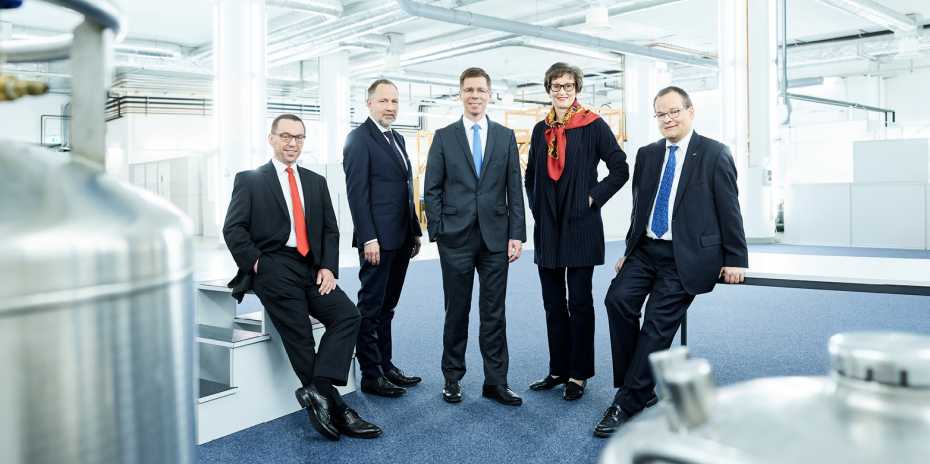Executive Board update 2020 / 5
The Executive Board is giving the green light for further measures to improve the work situation and to encourage people to treat one another with respect: the Board has defined a procedure for cases of inappropriate behaviour and is also launching a regular survey of the scientific staff.

ETH appoints a person in charge of political relations: Norbert Staub is leaving Corporate Communications and joining the Office of the President with effect from 1 September. Staub, who has been at ETH for many years, will be responsible for overseeing relationships with Swiss parliaments and authorities at federal, cantonal and local level. The objective of this new function is to cultivate contacts with political bodies and authorities and pool existing resources in an internal ETH network. In his new role, Staub will help the President to maintain relationships with political figures. He will also keep track of political developments and serve as a contact person to ensure that politicians have access to the right information. A survey the ETH Board conducted among the members of the Swiss federal parliament revealed that there is a clear need for closer and more frequent contact.
Procedure in cases of inappropriate behaviour
ETH Zurich is committed to a culture of mutual respect. Bullying, discrimination, threats, harassment or physical violence will not be tolerated. With a view to anchoring this culture of respect more firmly in the ETH community and to clearly define the associated processes, the Executive Board has enacted a regulation governing the procedure for cases of inappropriate behaviour, to take effect on 1 September 2020. To draw up and formulate the regulation, the Executive Board launched a broad consultation process that included multiple workshops and worked closely with the University Assembly, all university groups (Lecturers’ Conference [KdL], the association of non-faculty scientific staff [AVETH], the association of students at ETH [VSETH] and Staff Commission [PeKo]), and the ombudspersons. Various issues were clarified and misunderstandings rectified. The following points are key:
- Conflict situations are to be detected, defined, de-escalated and resolved as quickly as possible. The goal is to return to people treating one another with respect.
- Conflict resolution is conducted in an informal phase and, if necessary, a formal phase. The regulation clearly defines the associated processes, responsibilities, rights and obligations.
- During the informal phase, the person affected and any potentially necessary observers are advised with a view to clarifying the situation, de-escalating it and finding a resolution. As a matter of principle, the confidentiality and anonymity of the reporting person is preserved vis-à-vis the alleged instigator of the incident.
- In the formal phase, a written report is submitted to the Conflict Management (previously Case Management) office, under the jurisdiction of the Vice President of Personnel Development and Leadership. The Conflict Management office is responsible for further investigating the matter, de-escalating the conflict and working with all parties towards a solution. In doing so, it involves the affected person and the person suspected of causing the incident with the goal of settling the matter amicably. If necessary, the office may contact relevant departments to clarify issues and/or request statements. Dialogue, transparency and protection of all parties involved are key principles in this phase.
- The regulation defines the responsibilities and authority of internal and external bodies. It also lays down the limits of its jurisdiction relative to other regulations (e.g. Ordinance on Doctoral Studies) and procedures.
In October, information sheets and further documents on the regulation will be made available at www.ethz.ch/respekt. Training for those staffing the contact and advice services is scheduled for November 2020.
Regular surveys of the scientific staff
From 1 November, ETH Zurich will conduct regular surveys of the doctoral students, expanding these to postdocs and senior assistants as of 1 February 2021. The objective is to obtain continuous feedback about the scientific staff’s level of satisfaction, support and development. Doctoral students will be surveyed three times: the first time 12 to 15 months after they start work on their doctoral thesis; the second after 36 to 42 months; and the last time after they have completed their doctoral examination. The timing of the surveys for postdocs and senior assistants is slightly different.
The anonymous survey, conducted by an external polling agency, will include questions on the introductory period, support, personal and professional development, hiring conditions, respect, health and further career planning. ETH Zurich will receive anonymised results at department level. Further evaluation is possible only if a group returns at least five responses. To detect individual situations in good time, after completing the survey, participants can submit their contact information separately and request a meeting about their situation. The HR department will get in touch with them without having any information from the survey.
Comments
No comments yet